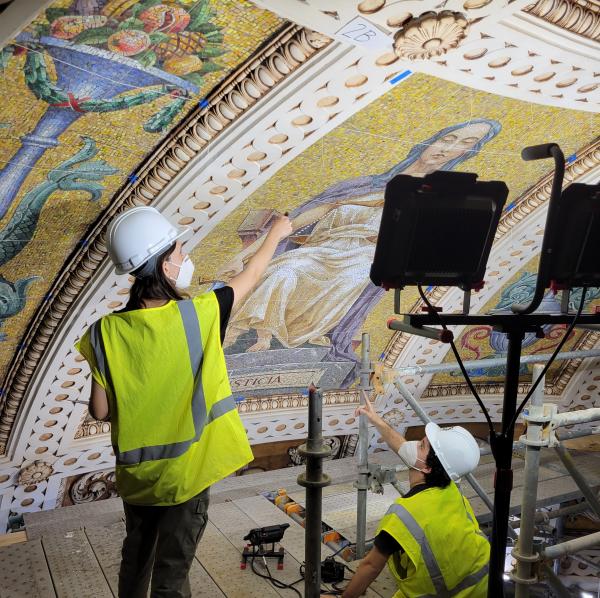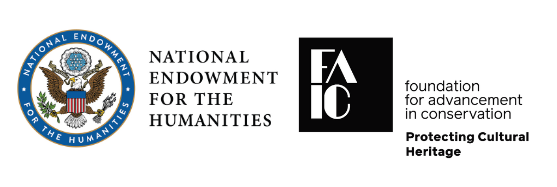New Resilience Resources for Anticipating and Mitigating Climate Change’s Impacts On Cultural Heritage Launches Today
An initiative of the National Endowment for the Humanities and the Foundation for Advancement in Conservation, in collaboration with Environment and Culture Partners, Free Online Resources Enable Cultural Organizations and Communities to Build Resilience

CENCOR Historic Buildings and Sites' staff developing a Conditions Assessment of the Interior Cupula at the Puerto Rico State Capitol in March 2022. The assessment included a detailed report on the conditions of Venetian mosaics, ornamental plasterwork, and stained glass elements.
Image courtesy of Héctor J. Berdecía-Hernández, CENCOR - Centro de Conservacion y Restauracion de Puerto Rico.

CENCOR Historic Buildings and Sites' staff developing a Conditions Assessment of the Interior Cupula at the Puerto Rico State Capitol in March 2022. The assessment included a detailed report on the conditions of Venetian mosaics, ornamental plasterwork, and stained glass elements.
Image courtesy of Héctor J. Berdecía-Hernández, CENCOR - Centro de Conservacion y Restauracion de Puerto Rico.
The National Endowment for the Humanities (NEH) and the Foundation for Advancement in Conservation (FAIC) today launched Climate Resilience Resources for Cultural Heritage (CRR), a suite of free resources that enables those who care for cultural resources in their communities to plan for and respond to climate change’s impacts. CRR is uniquely tailored to provide the stewards of archaeological, cultural, and historic sites and museums with a sound foundation for developing climate resilience strategies for cultural resources and their communities. The CRR's components support collaborative planning efforts among cultural resources and communities for the benefit of all.
FAIC’s CRR features three components:
- 1) A step-by-step guide to developing a resilience strategy, available in English and Spanish, on topics ranging from understanding vulnerabilities to climate change impacts and how collaboration builds resilience.
- 2) An interactive mapping tool that allows users to explore current and future risk information for climate-related hazards, such as flooding and extreme heat. Users can explore risk at various scales including address or site, neighborhood, and region for the United States and territories. The tool was developed in collaboration with Harvard University’s Center for Geographic Analysis.
- 3) Recommendations for forming and leading climate learning groups from cultural heritage stewards in New Mexico and Puerto Rico who used the CRR to develop resilience strategies to care for sites in their communities.
The CRR project grew from findings shared in Held in Trust, the Foundation for Advancement in Conservation’s four-year collaboration with the National Endowment for Humanities to address how cultural heritage conservation and preservation can evolve to confront pressing issues the country faces today and build a more resilient future. To bring together diverse perspectives in the climate and cultural heritage fields, as outlined in Held in Trust, FAIC partnered with Environment and Culture Partners (ECP) to guide the development of CRR.
“As stewards of our nation’s archives and collections—the cornerstones of our shared histories—we have a responsibility to anticipate and take measures to protect these valuable cultural resources from a changing climate and increased vulnerability to severe natural disasters,” said National Endowment for the Humanities Chair Shelly C. Lowe (Navajo). “CRR is a vital tool for everyone working to safeguard our history and heritage, offering guidance and support for creating resilient institutions equipped to plan for and respond to environmental threats.”
“From monuments, sites, and artifacts to the traditions, skills, and customs passed through generations, cultural resources help people understand the past and feel connected to each other. However, tools to safeguard cultural resources in the face of climate change can be hard to find and difficult to put into action. FAIC’s new and innovative CRR integrates a series of free tools and strategies uniquely tailored to support communities in preserving and conserving their cultural heritage in the face of climate change,” stated Foundation for Advancement in Conservation Executive Director Lissa Rosenthal-Yoffe. “We’re grateful to our partners at NEH for working alongside us to equip cultural organizations and communities with CRR. We all have a role to play in addressing climate change, and the time to act is now.”
“Climate-related disasters not only impact institutions, but also their entire communities and regions,” stated Environment and Culture Partners Co-Founder and Managing Director Stephanie Shapiro. “CRR helps organizations evaluate the risks and vulnerabilities they are facing, then identify opportunities to collaborate and share resources to prepare for and recover from disasters and emergencies. Climate affects us all, and no one should face the challenge alone.”
Related Programs
To amplify the launch of CRR and engage cultural-heritage professionals in timely discussions about addressing climate change’s impacts, FAIC is organizing and presenting programs expanding on the themes of this important initiative, including:
- Building Climate Resilience for Cultural Heritage (March 20; March 27; April 3, 2024, 1:00–2:00 p.m. ET): A webinar series introducing CRR hosted by FAIC. Registration details and the focus of each webinar can be found here.
- Climate Resilience Resources for Cultural Organizations and Communities Workshop at 2024 AAM Annual Meeting & MuseumExpo (May 19, 2024): A workshop for AAM Conference attendees on how to use CRR led by Stephanie Shapiro and José Ortiz, Director of the Library and Archives of the Centro para Puerto Rico, Sila M. Calderón Foundation, both of whom contributed to the development of CRR. Registration details can be found here.
- American Institute for Conservation’s Annual Meeting (May 20–24): The annual conference led by FAIC’s sister organization includes workshops, symposia, panels, and presentations that underscore the importance of preparedness through this year’s theme of “Expect the Unexpected: Embracing and Managing Change, Uncertainty, and Surprise.” Bank of America is the Lead Sponsor of the AIC Annual Meeting. Programmatic and registration details can be found here.
About the Foundation for Advancement in Conservation
The Foundation for Advancement in Conservation (FAIC) supports conservation education, research, and outreach activities that increase understanding of our global cultural heritage. Our mission is to save cultural heritage for future generations, protecting it from decay and destruction. We advance research and education, lead treatment and collection care initiatives, and deploy conservation expertise to where it is most urgently needed. Our work empowers conservation professionals, strengthens cultural institutions, and engages stakeholders, including public audiences, as we work together to protect cultural heritage for humanity. Learn more at culturalheritage.org and follow FAIC on X, Instagram, YouTube, and Facebook.
About the National Endowment for the Humanities
Created in 1965 as an independent federal agency, the National Endowment for the Humanities (NEH) supports research and learning in history, literature, philosophy, and other areas of the humanities by funding selected, peer-reviewed proposals from around the nation. Additional information about the National Endowment for the Humanities and its grant programs is available at neh.gov.
